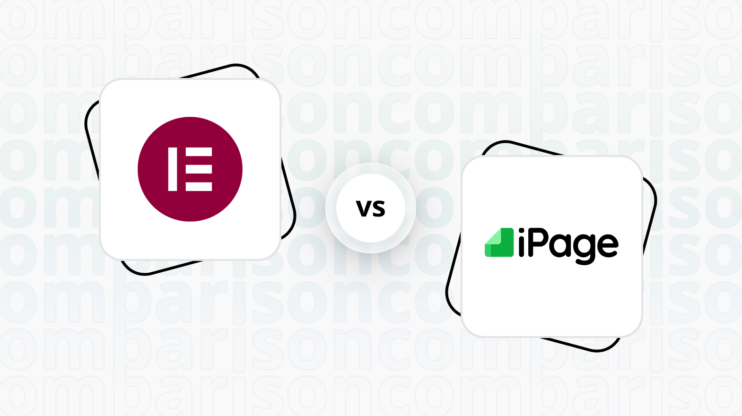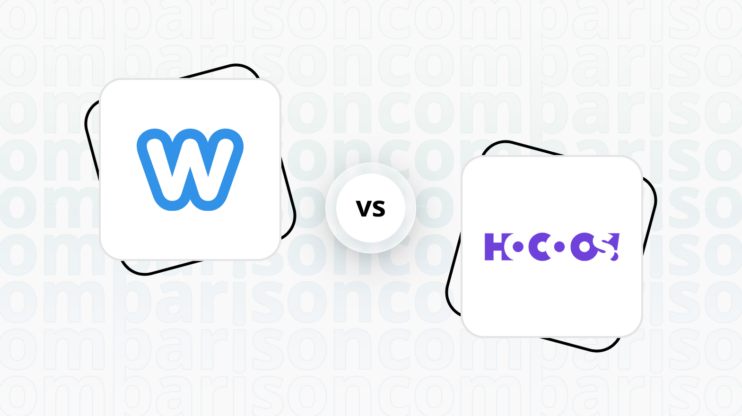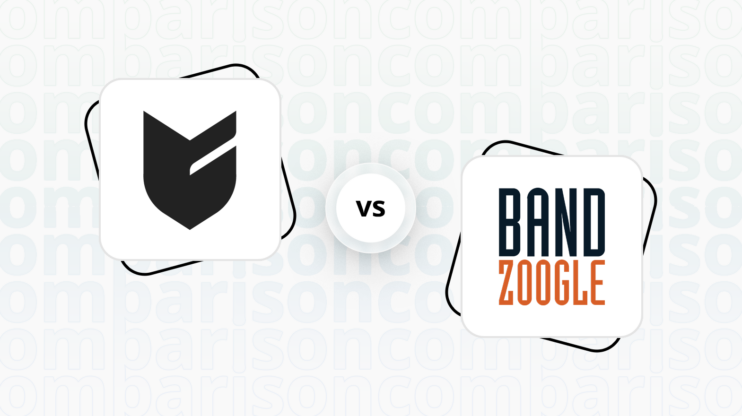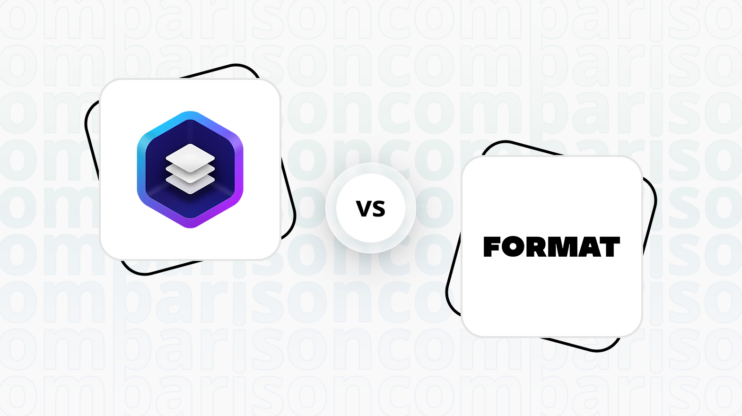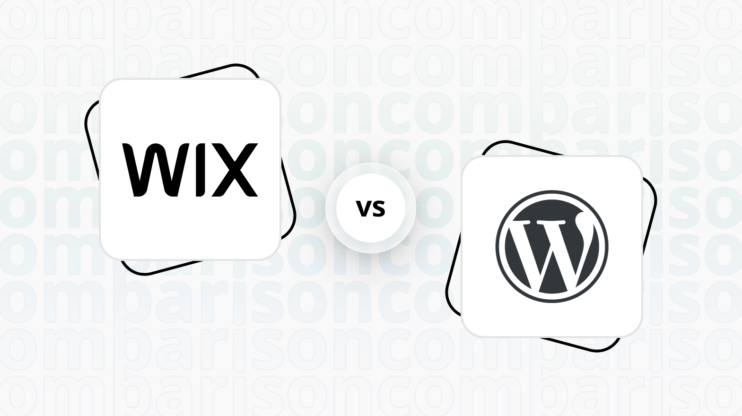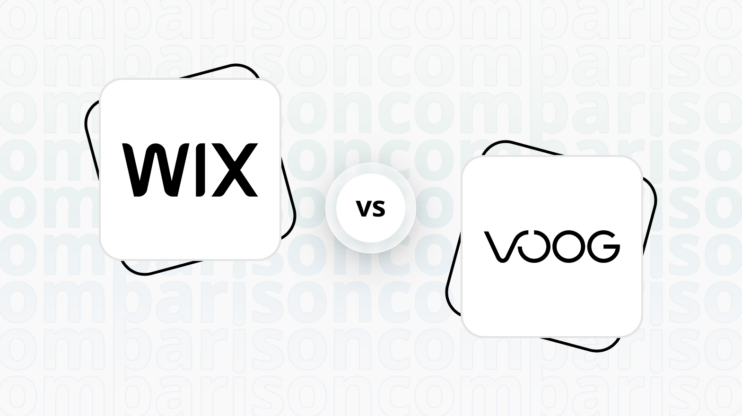Final verdict
Shopify and Portfoliobox cater to different needs, with Shopify excelling in ecommerce and Portfoliobox being ideal for creative professionals.
-
Shopify (Overall Grade: 8.1/10)
is a robust ecommerce platform designed for businesses looking to scale. It offers advanced inventory management, multi-channel selling, and detailed analytics, making it a top choice for serious online stores. Shopify’s extensive range of integrations, superior security features, and comprehensive customer support further enhance its appeal for ecommerce businesses. When comparing Shopify vs Portfoliobox, Shopify stands out for its powerful ecommerce capabilities and business growth tools. -
Portfoliobox (Overall Grade: 6.1/10)
is tailored for creative professionals such as artists, photographers, and musicians. It provides an intuitive drag-and-drop interface, customizable templates, and essential ecommerce functionalities, making it easy for users to showcase and sell their work online. While it may lack the advanced features needed for larger-scale operations, Portfoliobox excels in ease of use and affordability, making it a great choice for individuals looking to create professional portfolios. In the Shopify vs Portfoliobox comparison, Portfoliobox is the preferred option for creatives seeking a simple and effective way to present their work.

|

|
|
|---|---|---|
|
Design functionalities & templates |
8.2 |
7.5 |
|
Ease of use |
7.5 |
8.1 |
|
Ecommerce |
9.2 |
5.8 |
|
Website Editors |
7.9 |
7.5 |
|
Product testing options |
8.1 |
9.1 |
|
Price |
8.2 |
7.9 |
|
Hosting quality |
9.0 |
6.5 |
|
Website speed optimization |
7.8 |
6.4 |
|
Plugins and integrations |
8.7 |
7.2 |
|
Marketing features |
8.8 |
7.0 |
|
Customer support |
8.6 |
7.0 |
|
Security |
9.0 |
8.1 |
|
AI capabilities |
7.9 |
0 |
|
User Management |
6.5 |
2.8 |
Best for ecommerce
 9.2
9.2
 5.8
5.8
Verdict
: Portfoliobox is suitable for creative professionals with basic ecommerce needs, while Shopify is the superior choice for comprehensive and scalable ecommerce solutions.
-
Shopify
: Shopify excels in the ecommerce domain with its extensive range of features designed to support robust online stores. It offers advanced inventory management, multi-channel selling, and detailed analytics, making it a top choice for businesses looking to scale. When comparing Shopify vs Portfoliobox, Shopify’s advanced ecommerce capabilities make it the preferred option for serious online retailers. -
Portfoliobox
: Portfoliobox provides basic ecommerce functionalities suitable for creative professionals who want to sell their work online. It offers essential features like product listings, payment gateways, and order management. However, it lacks the advanced ecommerce tools and scalability that Shopify provides, making it less ideal for larger-scale operations.
Best for informational & business websites
 6.8
6.8
 7.5
7.5
Verdict
: Portfoliobox is better suited for creative professionals looking to showcase their work, while Shopify, though capable, is more tailored for ecommerce needs.
-
Shopify
: Shopify is primarily an ecommerce platform, offering a range of tools for product listing, payments, and order fulfillment. While it can be used for informational sites, its strengths are more aligned with online stores. The platform may feel overly complex for simple informational needs, scoring 6.8 in this category. -
Portfoliobox
: Portfoliobox is designed specifically for creative professionals, making it an excellent choice for portfolio websites. It offers a variety of customizable templates and an intuitive drag-and-drop interface, making it accessible for users without technical skills. Scoring 7.5, Portfoliobox is particularly suitable for artists, photographers, and other creatives looking to showcase their work effectively online. When comparing Shopify vs Portfoliobox, Portfoliobox stands out for its ease of use and design flexibility.
Detailed comparison
Design functionalities & templates
Design FunctionalitiesRepresents how well each platform allows for creative design and customization of websites.Score Components:
- Template Variety (30%): Range and quality of design templates.
- Customization (30%): Flexibility and options for design alterations.
- User Interface (20%): Ease and intuitiveness of the design process.
- Responsiveness (10%): Adaptability to different devices and screen sizes.
- Innovation (10%): Unique design features and tools.
 8.2
8.2
 7.5
7.5
🏆
Winner: Shopify.
Shopify excels in providing a professional and sophisticated look for ecommerce sites, with a strong focus on online stores and advanced features for a robust brand presence.
Shopify’s templates are sleek and professional, ideal for ecommerce sites. They offer a sophisticated look with a focus on online stores. While the free template selection is not large, Shopify’s premium theme store provides a variety of industry-specific options, offering advanced features for a strong brand presence.
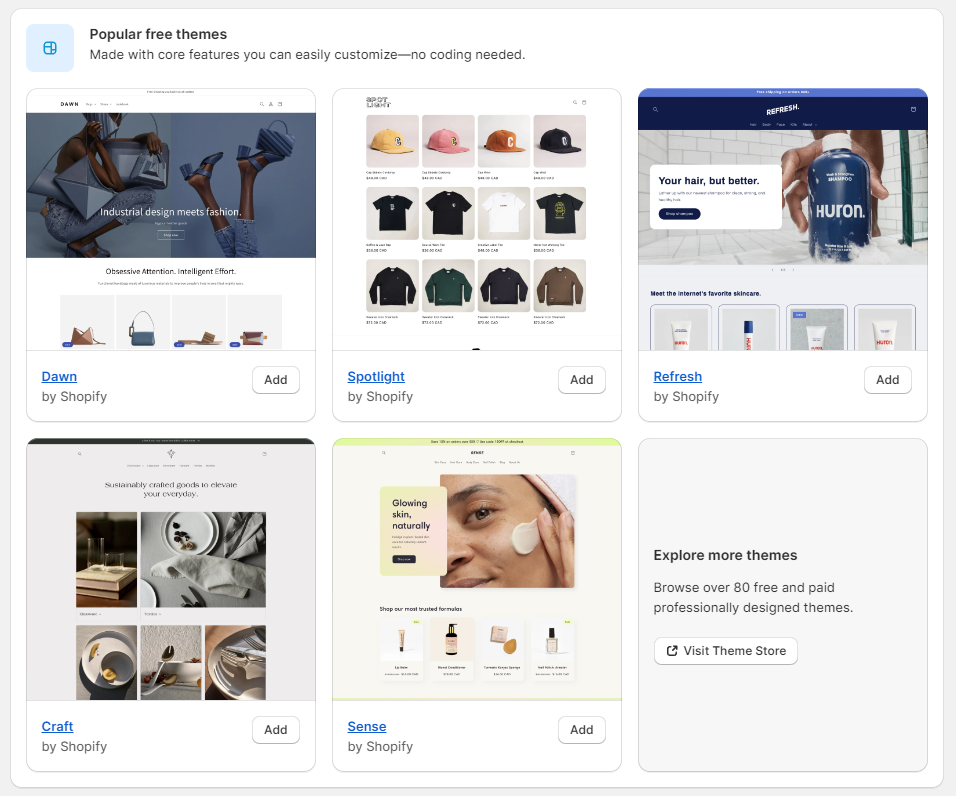
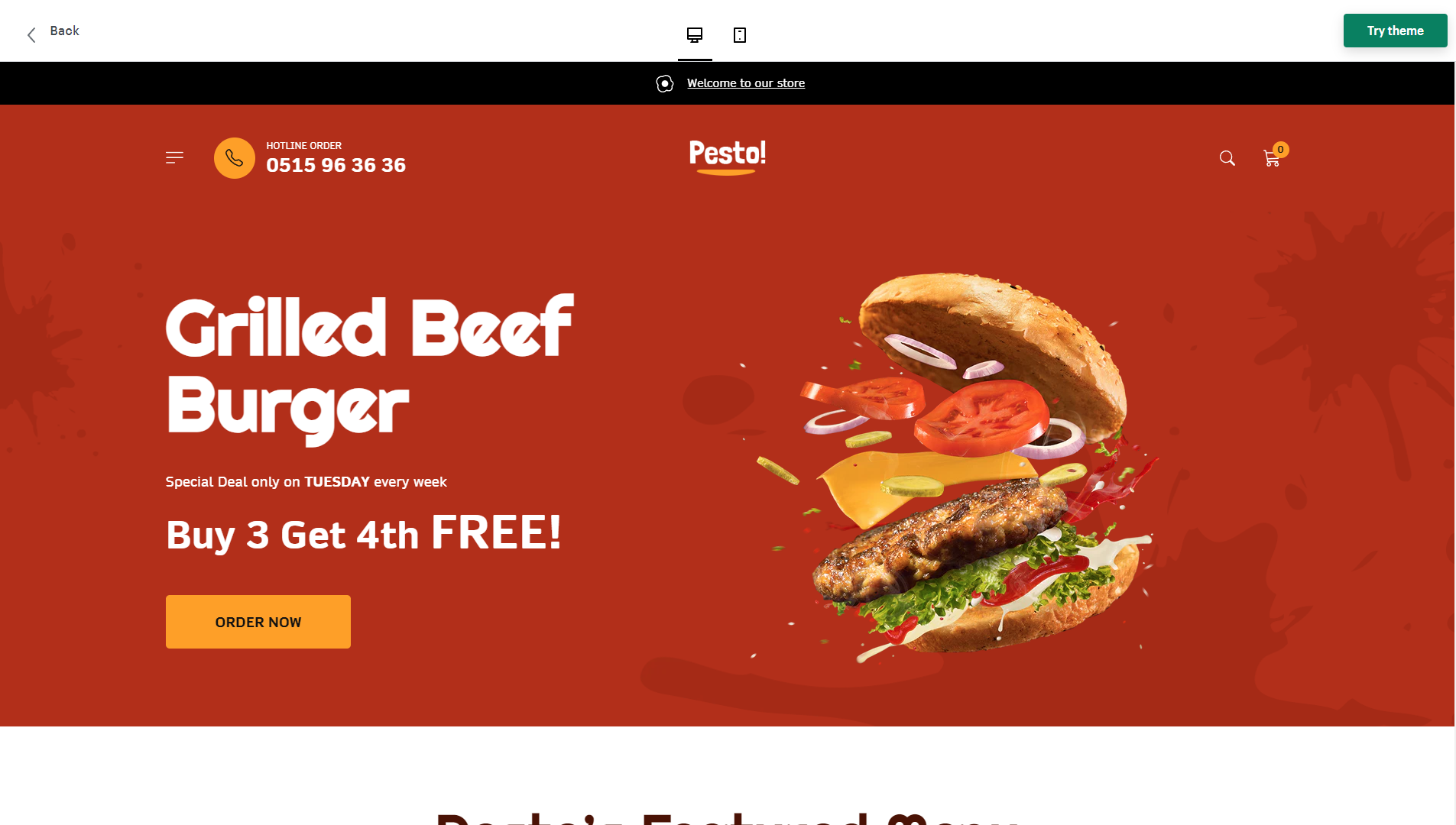
Portfoliobox is a user-friendly platform that allows for the creation of professional portfolio websites, accessible to individuals at any skill level. It offers over 30 customizable templates tailored to a variety of professional needs and preferences, including galleries, blogs, and online stores. The platform also provides features for enhanced functionality such as Adobe Lightroom integration, SSL security, marketing tools, and SEO-friendly options. With its intuitive design and comprehensive toolset, Portfoliobox serves as a versatile solution for creatives looking to establish or expand their online presence.
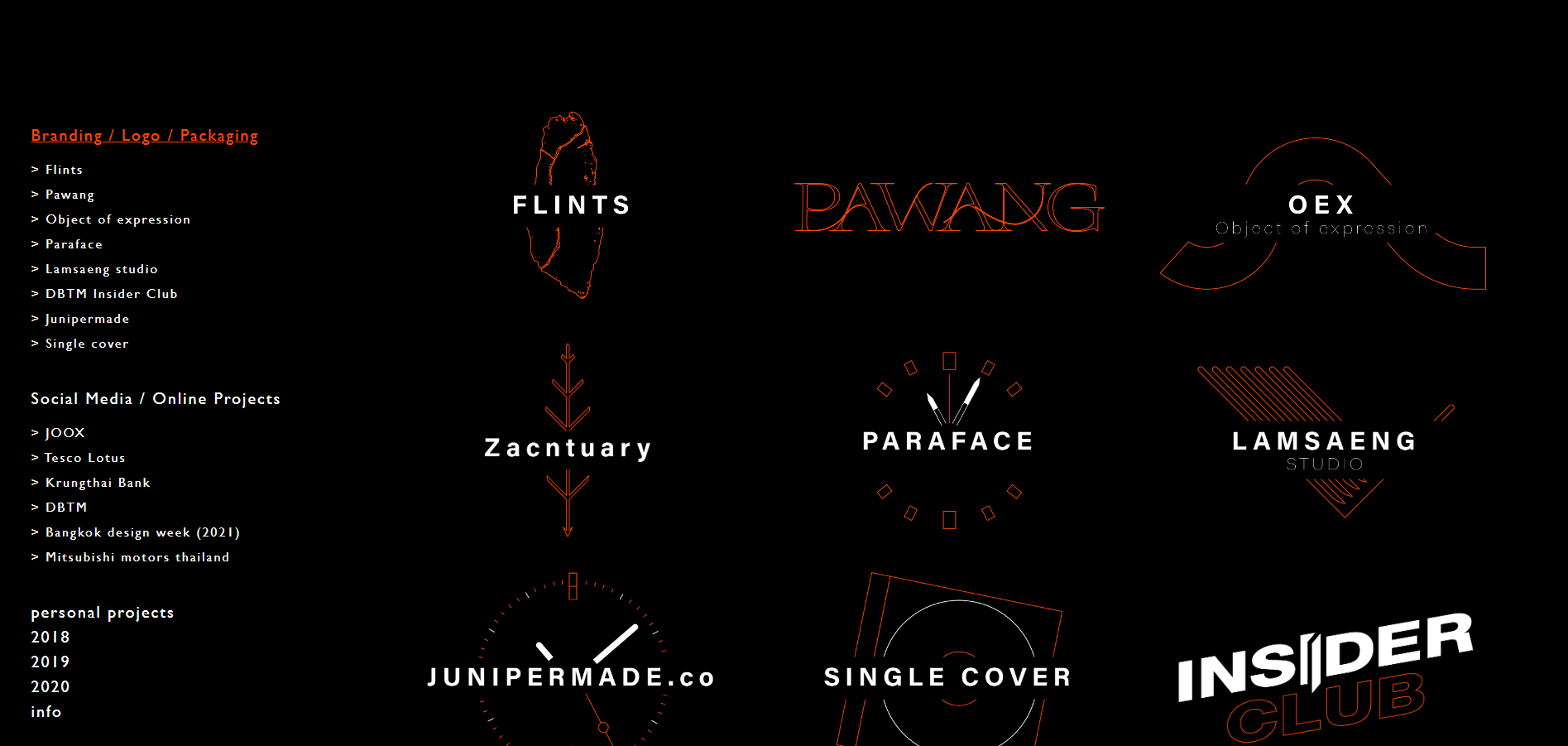
Get a head start on website creation with AI
Create a custom website tailored to your business needs 10X faster with 10Web AI Website Builder!
Ease of use
Ease of useReflects the platform’s overall user-friendliness.Score
Components:
- Learning curve (40%): Quickness and ease of getting started.
- Interface design (30%): Simplicity and intuitiveness of layout.
- User guidance (20%): Quality of tutorials and support.
- Flexibility (10%): Adaptability to various user skills.
 7.5
7.5
 8.1
8.1
🏆 Winner: Portfoliobox
. With a score of 8.1, Portfoliobox excels in ease of use, particularly for creative professionals looking to showcase their work. Its intuitive drag-and-drop interface and customizable templates make it accessible for users without technical skills. Shopify, scoring 7.5, offers a robust platform with a user-friendly design but has a steeper learning curve, especially for those new to ecommerce. For those prioritizing ease of use, Portfoliobox is the superior choice.
Learning Resources
🏆 Winner: Shopify
. Shopify provides an extensive library of articles, tutorials, webinars, and video courses, focusing primarily on setting up and managing online stores. This comprehensive support ensures users can effectively learn and adapt to the platform.
For ecommerce
EcommerceMeasures the platform’s effectiveness in supporting online business activities.Score Components:
- Ecommerce themes and templates (20%): Variety and design of templates.
- Product management (25%): Ease of managing and organizing products.
- Payment options (25%): Variety and convenience of payment methods.
- Ecommerce features (20%): Features for managing an ecommerce store.
- Integration (10%): Compatibility with external e-commerce tools and services.
 9.2
9.2
 5.8
5.8
Shopify excels in the ecommerce domain with its extensive range of features designed to support robust online stores. It offers advanced inventory management, multi-channel selling, and detailed analytics, making it a top choice for businesses looking to scale. Portfoliobox, on the other hand, provides basic ecommerce functionalities suitable for creative professionals who want to sell their work online but may lack the advanced features needed for larger-scale operations.

|

|
|
|---|---|---|
|
Ecommerce themes and templates |
8.2 |
3.0 |
|
Product page customization |
8.5 |
6.0 |
|
Payment processing and commissions |
8.8 |
7.0 |
|
POS capabilities |
8.1 |
2.0 |
|
Payment gateways |
9.5 |
5.0 |
|
Product numbers |
9.0 |
5.5 |
|
Additional ecommerce features |
9.1 |
4.5 |
Shopify ecommerce features:
- Comprehensive store builder
- Shopify Payments and other gateways
- Advanced inventory management
- Multi-channel selling
- Abandoned cart recovery
- Detailed analytics and reporting
Portfoliobox ecommerce features:
- Product listings
- Payment Gateways integrations
- Shipping rates and tax calculations
- Order management
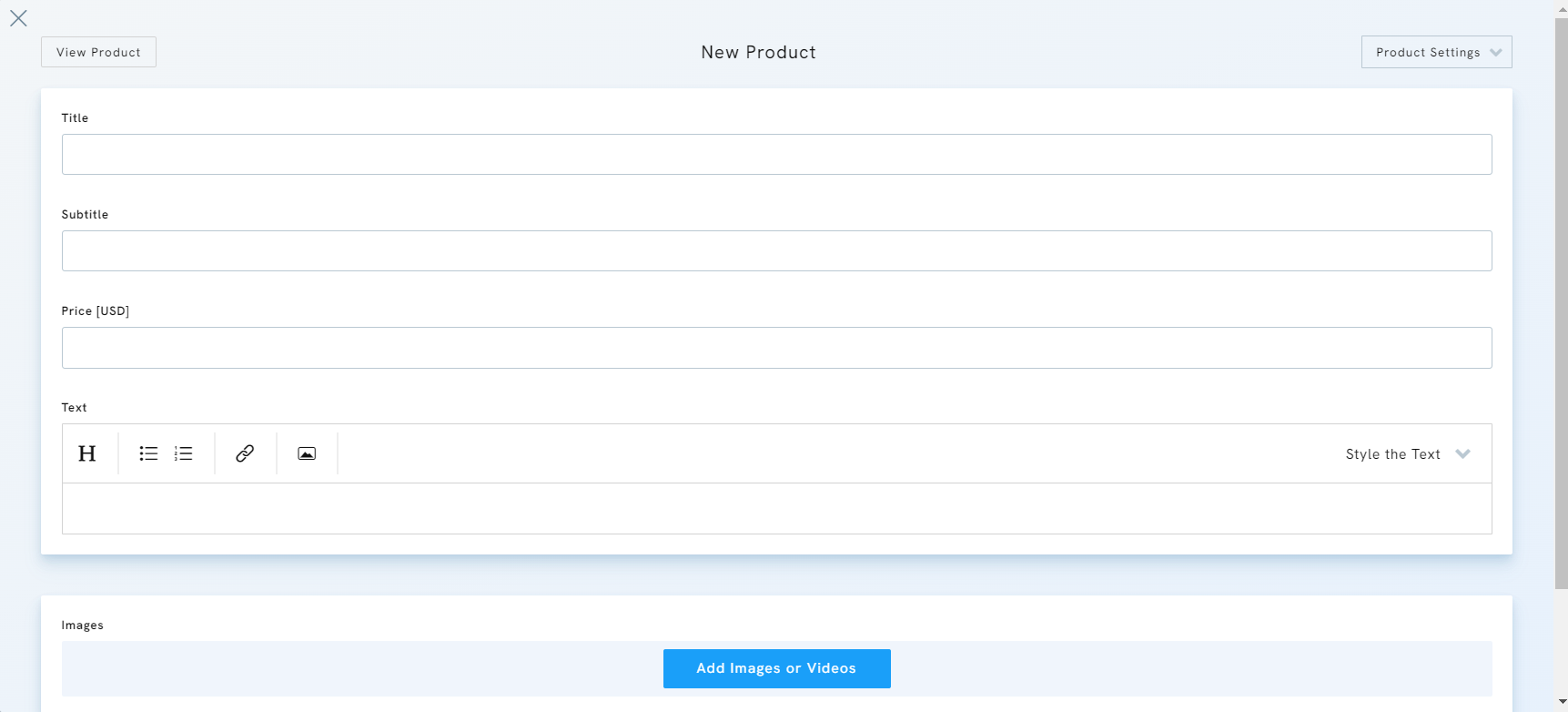
Ecommerce themes & templates
Shopify offers about 150 modern and responsive themes for creating a virtual storefront, ensuring a good look on both desktop and mobile devices. While some themes are free, others cost between $170 to $380. In contrast, Portfoliobox does not have ecommerce-specific templates, which may limit the visual appeal and functionality of online stores built on its platform.
Product page customization
Shopify has a limit of three options per product, totaling 100 unique variations. This limit may not pose a significant constraint, and it is suggested that for products with numerous options, creating separate listings on Shopify can be a more manageable approach. While Shopify offers titles, descriptions, and image galleries with zoom effects, customization options like adding ribbons, size charts, and wishlists are not as straightforward. However, Shopify distinguishes itself with additional features through its extensive library of extra apps, offering functionalities like reviews, Facebook stores, eBay item importers, and a unique Augmented Reality feature for an enhanced customer experience.
Portfoliobox offers a streamlined process for customizing product pages on its website builder. Users can create a product by adding details like title, description, and media, set a release date, and manage inventory and tax options. They can also edit product settings, such as the URL and shipping options, and apply discounts. These features are designed to help users effectively manage their online store and products within the Portfoliobox environment.
Payment processing
When it comes to payment processing, Shopify offers payments with typical charges of
2.9% + 30¢
per online transaction on basic plans, and lower fees for higher-tier plans. However, it adds extra fees for using other payment gateways. Shopify Payments is Shopify’s own payment processing gateway. It allows merchants to accept credit card payments directly on their store without having to integrate third-party payment providers. This simplifies the payment process, reduces transaction fees, and streamlines the handling of finances.
Portfoliobox supports selling prints, art, craft, or services online through its e-commerce solution, and notably, they do not charge any commission for transactions made through their platform. While specific payment gateways are not detailed in the information found, Portfoliobox mentions accepting credit card payments (Visa, Master, & Maestro) for its subscriptions, implying these may also be supported for transactions within its e-commerce functionality. However, there’s no explicit mention of POS (Point of Sale) capabilities, suggesting that the platform is primarily focused on online sales rather than physical retail or in-person transactions.
Considering the features, availability, cost, and flexibility, Shopify appears to be a more robust and flexible ecommerce solution compared to Portfoliobox. However, for creative professionals looking for a simple way to sell their work online, Portfoliobox may still be a viable option.
Website Editors
Website EditorsEvaluates the platforms’ website building and editing capabilities.Score Components:
- Customization tools (40%): Range and power of editing features.
- Editor usability (30%): User experience within the editor.
- Design flexibility (20%): Freedom in layout and design changes.
- Update and maintenance ease (10%): Simplicity of updating and maintaining the site.
 7.9
7.9
 7.5
7.5
🏆
Winner: Shopify
. Shopify, with a score of 7.9, excels in providing a streamlined, ecommerce-focused editing experience. It’s particularly beneficial for users who prioritize efficient management of online stores. The editor is straightforward, making it easy to add products, manage inventory, and set up payment methods. While it may not offer the same level of design flexibility as Portfoliobox, Shopify’s editor is optimized for sales and business growth, with built-in tools specifically designed for ecommerce businesses.
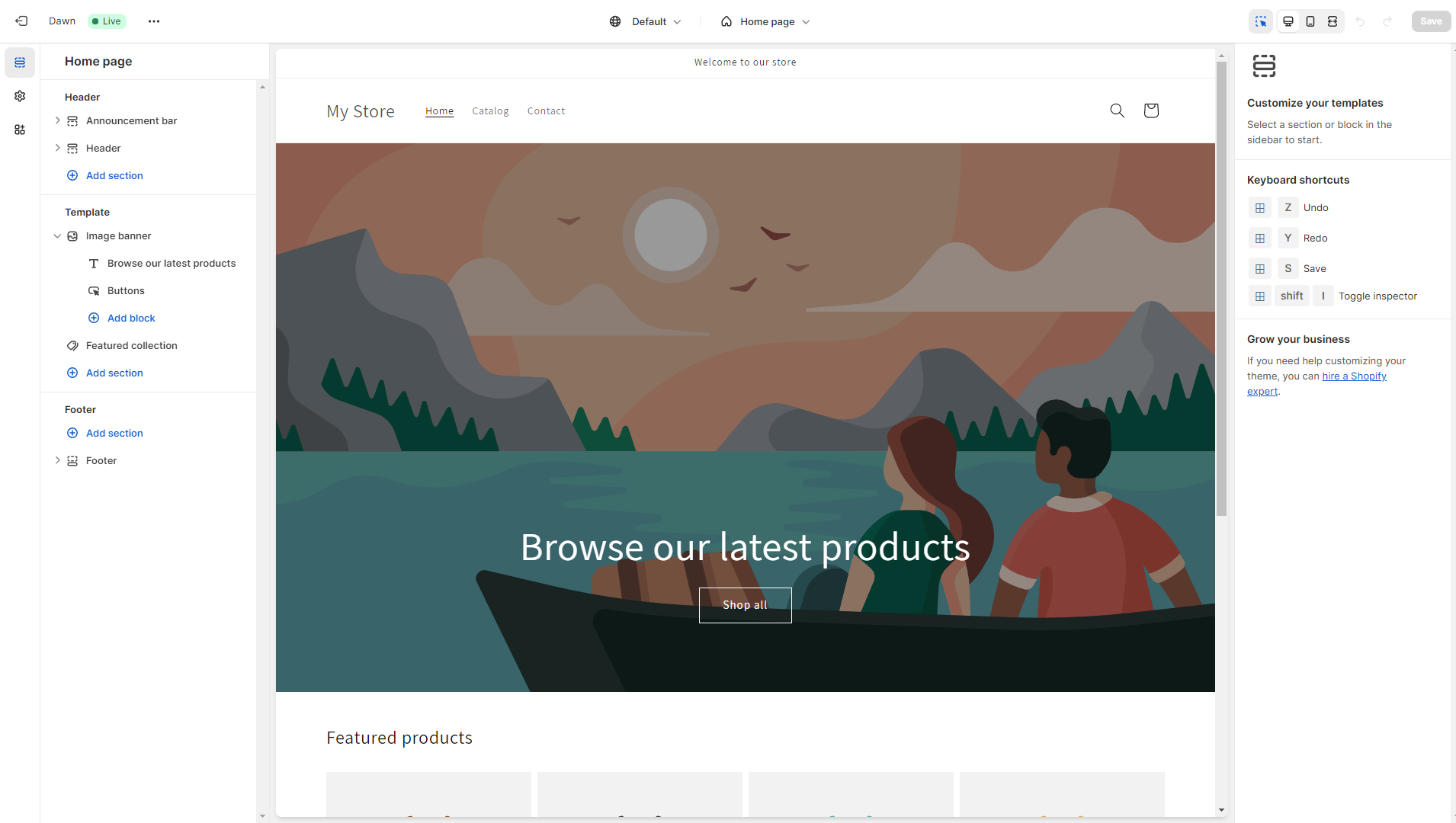
Portfoliobox’s editor, scoring 7.5, is tailored for creative professionals, providing an array of tools for building and customizing portfolio websites. Features include blog management with a commenting system, customizable image galleries with security options, and the ability to sell digital products. It also supports SEO optimization, social media, and analytics integration for enhanced online presence. While praised for its ease of use and variety of features, some users may find it limited for advanced, detailed content needs.
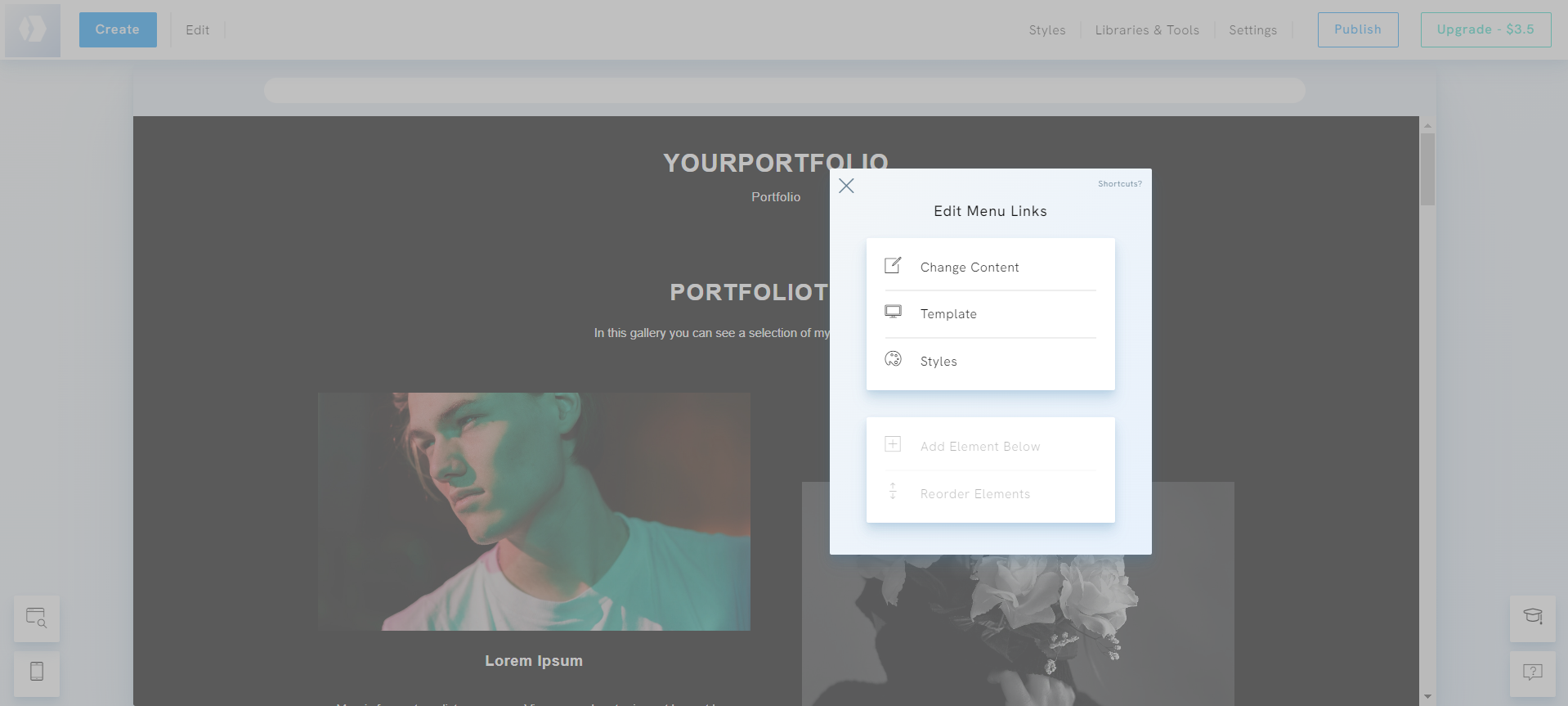
Mobile editor/app
 8.0
8.0
 0
0
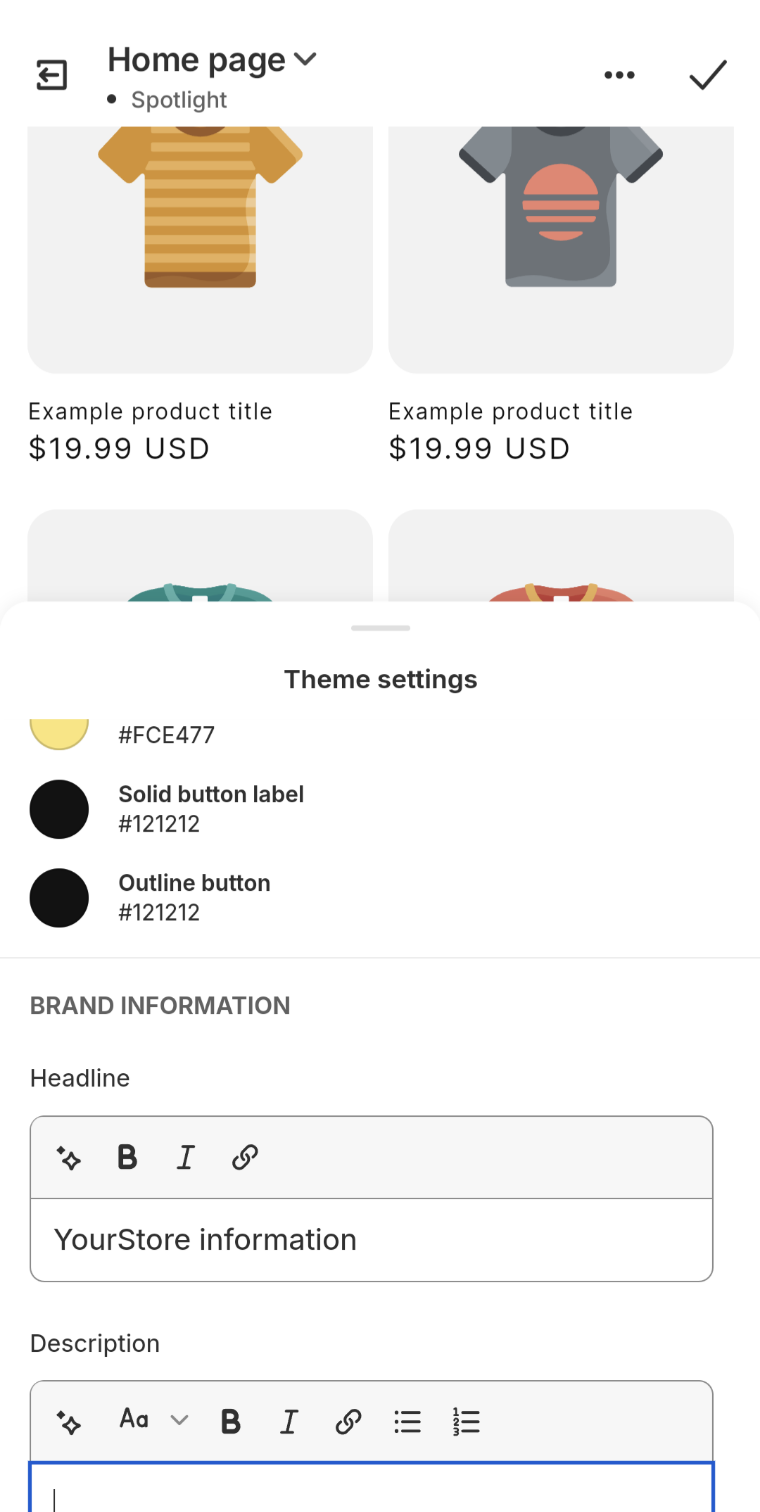
🏆
Winner: Shopify
. Shopify offers a robust mobile app that includes a user-friendly mobile theme editor. This feature allows users to customize their online store directly from their mobile device, enabling the addition, removal, editing, and rearrangement of content on the store’s website. This makes it convenient for on-the-go adjustments to the store’s appearance and layout, which is particularly beneficial for ecommerce businesses that need to manage their stores efficiently.
Portfoliobox, on the other hand, does not have a dedicated mobile editor app. This lack of mobile editing capabilities can be a significant drawback for users who need to make quick updates or manage their portfolio websites while away from their desktops.
In summary, Shopify’s mobile editor app provides a comprehensive and convenient solution for ecommerce management, whereas Portfoliobox’s absence of a mobile editor app limits its flexibility for mobile use.
Product testing options
Product Testing OptionsAssesses the options for trying out platform features before commitment.Score Components:
- Trial quality (40%): Extent and usefulness of the trial or free version.
- Feature accessibility (30%): How many features are available to test.
- Trial duration (20%): Length of the trial period.
- Ease of transition (10%): Smoothness of moving from trial to paid plans.
 8.1
8.1
 9.1
9.1
Overall Result
:
Portfoliobox wins
. Portfoliobox scores 9.1, surpassing Shopify’s score of 8.1. Portfoliobox offers a more extended 30-day free trial period compared to Shopify’s 14-day trial, allowing users more time to explore all features. Both platforms allow testing of all premium features during their respective trial periods. Additionally, Portfoliobox provides a 14-day money-back guarantee, adding an extra layer of assurance for users.

|

|
|
|---|---|---|
|
Free Plan |
No | No |
|
Trial Duration |
14 days |
30 days |
|
Testing Premium Features |
All features during free trial |
All the features within the trial period |
|
Money Back Guarantee |
14-day free trial |
14-day money back guarantee |
Price
PriceLooks at the cost-effectiveness and value for money of each platform.Score Components:
- Plan value (40%): What each pricing tier offers.
- Transparency and clarity (30%): Clearness of pricing structures.
- Flexibility of plans (20%): Range of options to suit different budgets.
- Hidden costs (10%): Additional expenses not included in the plan.
 8.2
8.2
 7.9
7.9
Shopify offers more comprehensive ecommerce features at a higher price point, while Portfoliobox provides more affordable options tailored for creative professionals.

|

|
|
|---|---|---|
|
$0-$10 |
No offering at this amount. |
Light ($5.50/month): 50 Images, 10 Pages, 5 Products, 1 Password Protected Page, 1 Booking Service, 1 Scheduling Service, 1 Invoice, 1 QR Code, 25 mb File Sharing. Value for Price: 6.0 |
|
$10-$15 |
No offering at this amount. |
Pro ($14.50/month): 500 Images, 50 Pages, 10 Products, 2 Password Protected Pages, 2 Booking Services, 2 Scheduling Services, 2 Invoices, 2 QR Codes, 50 mb File Sharing, Customizable Templates, Free Custom Domain (yourname.com), 24/7 Support. Value for Price: 7.5 |
|
$15-$30 |
Shopify Basic ($29/month): Unlimited products, 2.9% + 30¢ card fee with Shopify payments, Extra 2% gateway fee without Shopify Payments, Abandoned cart recovery, Automated sales tax, Digital products, POS Integration, 2 staff accounts. Value for Price: 8.0 |
Pro Plus ($18.50/month): 1,000 Images, 1,000 Pages, 1,000 Products, 1,000 Password Protected Pages, 1,000 Booking Services, 1,000 Scheduling Services, 1,000 Invoices, 1,000 QR Codes, 5,000 mb File Sharing, Customizable Templates, Free Custom Domain (yourname.com), 24/7 Support, No “Powered by Portfoliobox” Link, Adobe Lightroom Integration. Value for Price: 9.0 |
|
$70-$80 |
Shopify Standard ($79/month): Lower card fees (2.6% + 30¢), Gift cards, Professional reports, 5 staff accounts. Value for Price: 8.5 |
No offering at this amount. |
|
$200+ |
Advanced Shopify ($299/month): Lowest card fees (2.49% + 30¢), Advanced report builder, Real-time carrier shipping, Up to 15 staff accounts. Value for Price: 8.8 |
No offering at this amount. |
location. As a result in rare cases the prices displayed here can differ from the ones you see on their
websites.
Hosting quality
Hosting
qualityExamines the reliability and performance of the hosting solutions.Score Components:
- Uptime (40%): Consistency and reliability of website availability.
- Speed (30%): Loading times and performance.
- Bandwidth and storage (20%): Sufficiency of resources provided.
- Data centers (10%): Quality and distribution of hosting infrastructure.
 9.0
9.0
 6.5
6.5
Winner: Shopify
. Shopify outshines Portfoliobox with its proprietary cloud-based hosting, 99.99% uptime guarantee, and strategically located global data centers. Portfoliobox, while offering managed cloud hosting with unlimited bandwidth, does not disclose uptime statistics or data center locations, making it less reliable for high-traffic needs. Shopify’s robust infrastructure makes it the superior choice for hosting quality.

|

|
|
|---|---|---|
|
Do they offer hosting? |
Yes, included in all paid plans |
Yes, with unlimited bandwidth and secure communications through HTTPS on CDN servers |
|
Data Centers: |
5 globally: USA (Ashburn, Virginia; Santa Clara, California), Canada (Toronto, Ontario), Ireland (Dublin), and Singapore |
Portfoliobox does not disclose the locations of its data centers |
|
Type of hosting: |
Proprietary cloud-based hosting |
Managed Cloud Hosting |
|
Uptime: |
99.99% |
Portfoliobox does not disclose uptime statistics |
|
Uptime Guarantee: |
Yes, 99.99% |
No |
Website Speed Optimization
Website Speed OptimizationEvaluates optimization of website loading timesScore Components:
- PageSpeed Score (30%): Google’s score indicating performance optimization.
- Loading Time (30%): The average time until a website is fully interactive.
- Mobile Optimization (15%): Optimization effectiveness for mobile devices.
- Resource Optimization (15%): Optimizing images, scripts, and other heavy resources.
- CDN Usage (10%): Use of CDN to enhance speed across geolocations.
 7.8
7.8
 6.4
6.4
🏆 Winner: Shopify
Both Shopify and Portfoliobox have their own strategies for optimizing website speed, but Shopify’s comprehensive approach and higher score give it an edge in this comparison.

|

|
|
|---|---|---|
|
Focus |
App efficiency, Theme optimization |
CDN, Caching, Responsive Design |
|
Performance Tools |
Google Lighthouse, PageSpeed Insights |
Varies |
|
Key Strategies |
App efficiency, Theme optimization |
CDN, Caching, Responsive Design |
|
Load Times |
Varies widely, dependent on optimization |
Varies depending on optimization |
|
Page Speed Scores Range |
Scores vary; influenced by apps, images |
Varies depending on optimization |
|
Core Web Vitals Improvement |
Emphasis on LCP, FID, CLS improvements |
Not specified |
Shopify, an ecommerce website builder and hosting platform, places a strong emphasis on website performance and page speed. Shopify’s approach to enhancing site speed includes app optimization by removing unneeded app code, conditionally loading apps, avoiding immediate pop-up displays, and incorporating app functionality directly into themes. This approach leverages Shopify’s fast servers and CDN network to boost load speed. Shopify also suggests utilizing Google AMP for faster mobile page loads, although with some design compromises. Analysis of Shopify sites shows a range of speed scores and load times, which vary widely depending on the level of optimization applied.
Portfoliobox, designed for creative professionals, employs strategies such as CDN, caching, and responsive design to optimize website speed. While Portfoliobox provides a user-friendly platform for creating stunning portfolios, it does not offer detailed information on Core Web Vitals improvements. The load times and PageSpeed scores for Portfoliobox websites vary depending on the level of optimization, but the platform’s focus on CDN and caching helps in delivering content efficiently.
In conclusion, while both platforms have their strengths, Shopify’s comprehensive approach to speed optimization and higher score make it the better choice for those prioritizing website performance.
Get a head start on website creation with AI
Create a custom website tailored to your business needs 10X faster with 10Web AI Website Builder!
Plugins and integrations
Plugins and integrationsMeasures the range and effectiveness of additional plugins and integrations.Score Components:
- Variety of options (40%): Range of available add-ons.
- Integration smoothness (30%): Ease of integrating plugins into the site.
- Quality of plugins (20%): Functionality and reliability of the options.
- Custom integration capabilities (10%): Support for custom or third-party integrations.
 8.7
8.7
 7.2
7.2
🏆 Winner: Shopify.
Shopify scores 8.7, excelling with its extensive range of over 8,000 apps in its App Store. These apps cover a wide array of functionalities, including advanced sales, marketing, payment options, and more, making it a robust choice for ecommerce businesses. Portfoliobox, with a score of 7.2, offers a variety of plugins primarily through Common Ninja and Elfsight platforms, enhancing its capabilities for creative professionals. However, Shopify’s comprehensive and specialized integrations give it a significant edge.
It is worth noting that Portfoliobox’s integrations are particularly beneficial for creative professionals looking to add interactive and advanced features to their portfolio websites.
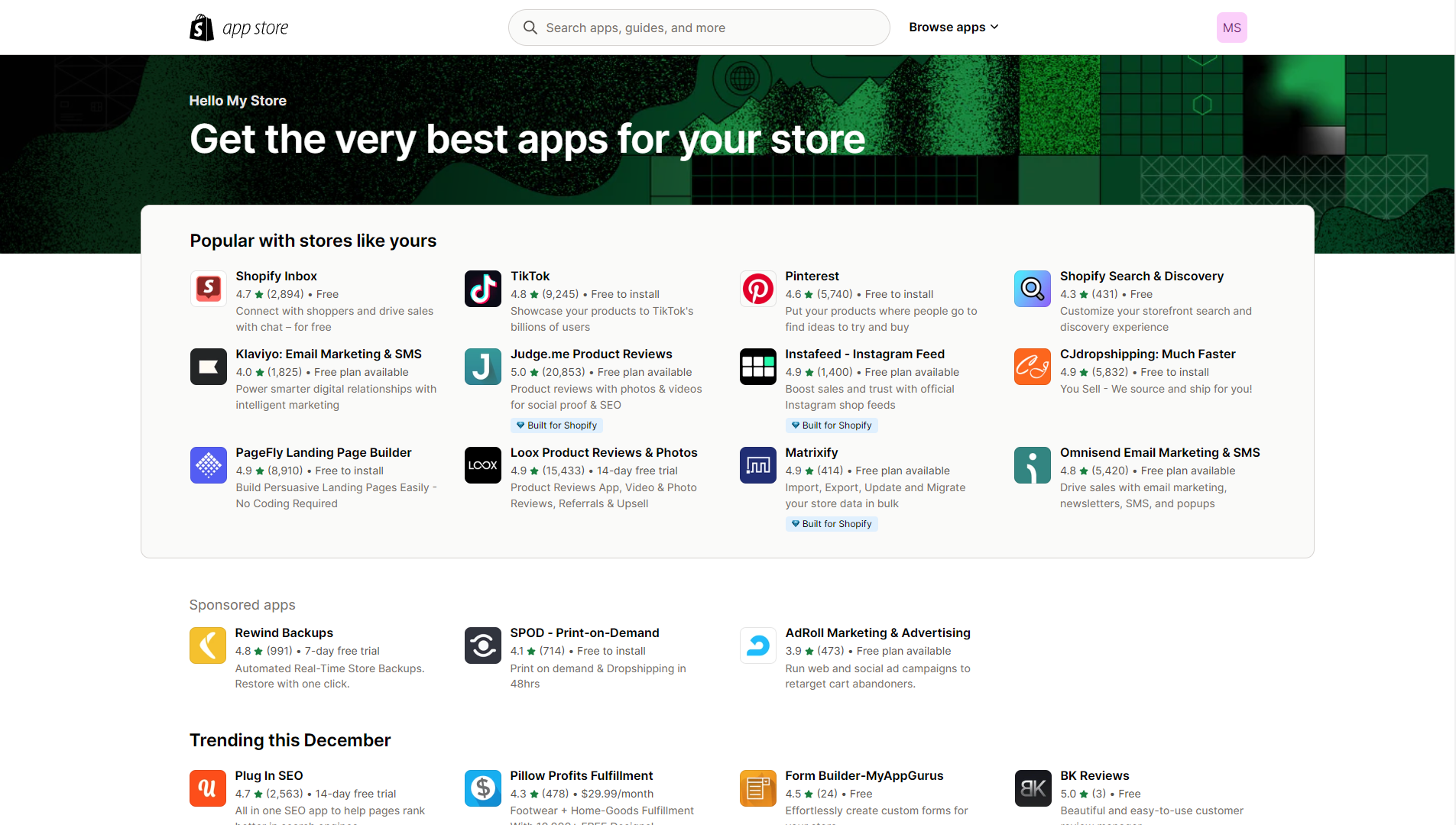
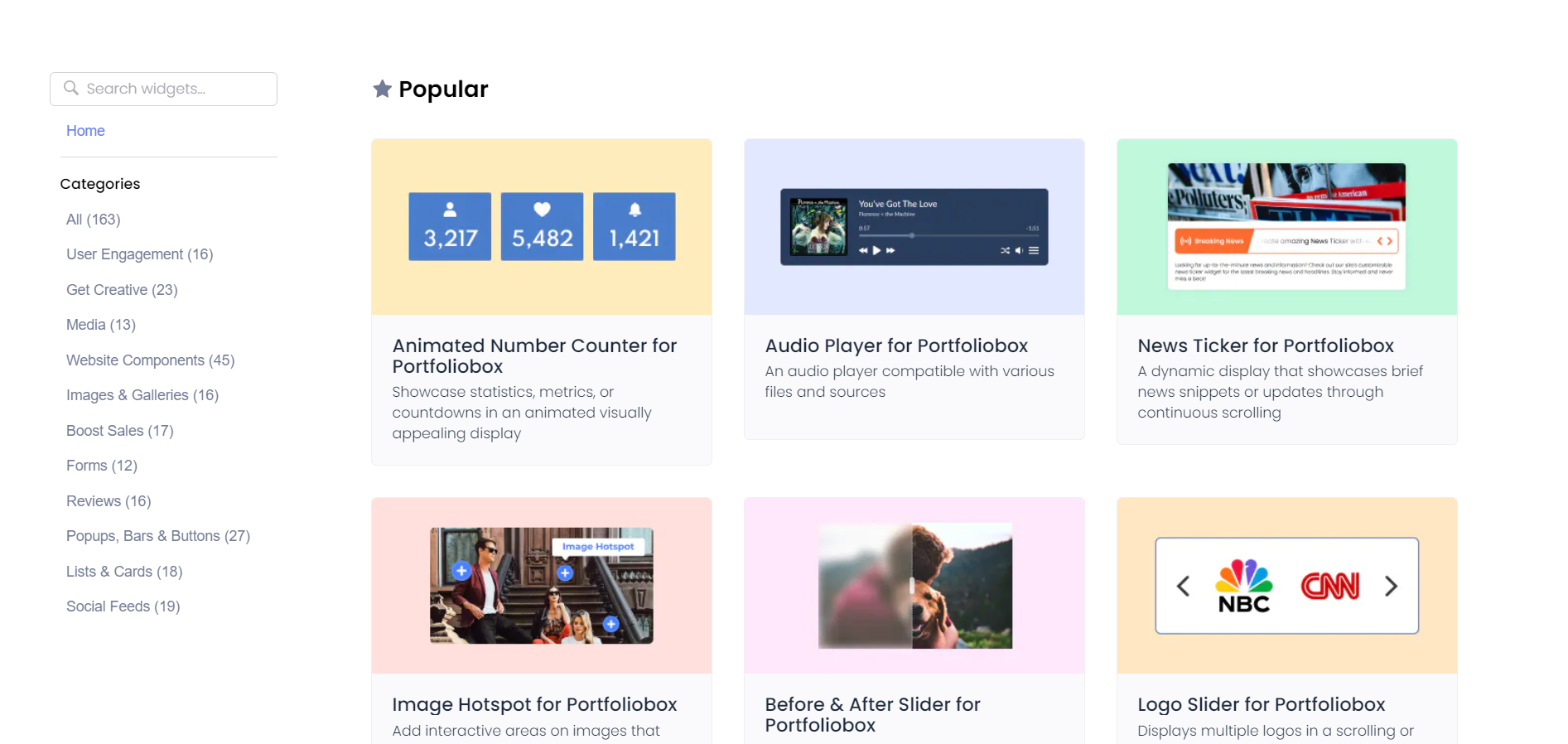
Marketing Features
Design FunctionalitiesRepresents how well each platform allows for creative design and customization of websites.Score Components:
- Template Variety (30%): Range and quality of design templates.
- Customization (30%): Flexibility and options for design alterations.
- User Interface (20%): Ease and intuitiveness of the design process.
- Responsiveness (10%): Adaptability to different devices and screen sizes.
- Innovation (10%): Unique design features and tools.
 8.8
8.8
 7.0
7.0
Overall Winner: Shopify
. Shopify excels with its advanced ecommerce marketing tools, making it ideal for businesses looking to drive sales and engagement. Portfoliobox, while strong in essential marketing features, is more suited for creative professionals focusing on portfolio presentation.

|

|
|
|---|---|---|
|
SEO Tools |
✓ |
✓ |
|
Email Marketing |
✓ |
✓ |
|
Blogging |
✓ |
✓ |
|
Social Media Integration |
Advanced integration for selling directly on social platforms |
Comprehensive integration for portfolio visibility |
|
Analytics and Reporting |
Detailed analytics for in-depth insights |
Comprehensive analytics with third-party integrations |
|
Ads and Promotions |
Google Ads integration; sophisticated ad campaign management |
Not available |
Customer Support
Customer supportEvaluates the quality and availability of support options.Score Components:
- Response time (40%): Speed of support responses.
- Support quality (30%): Effectiveness and helpfulness of the support.
- Availability (20%): Range of support channels (phone, chat, email).
- Resource richness (10%): Quality of self-help and educational materials.
 8.6
8.6
 7.0
7.0
🏆 Winner: Shopify
. Comparing Shopify vs Portfoliobox, Shopify excels in this category with a customer support score of 8.6. Shopify offers 24/7 support through chat, email, and phone, ensuring that users can get help at any time. The platform also provides clear tutorials, an extensive community forum, and a valuable marketing blog, making it easier for users to find solutions and grow their businesses. For enterprise-level businesses, Shopify offers dedicated account managers, priority support, and additional resources like the Shopify Plus platform and exclusive events.
Portfoliobox, with a customer support score of 7.0, also provides 24/7 customer support. Their dedicated team is available to offer professional guidance and assistance whenever needed. However, Portfoliobox lacks the extensive enterprise-level support and additional resources that Shopify offers, making it less suitable for larger businesses with more complex needs.
Security
SecurityLooks at the platforms’ security measures and data protection.Score Components:
- Data protection (40%): Safeguards for user and customer data.
- SSL and encryption (30%): Implementation of secure connections.
- Compliance (20%): Adherence to industry security standards.
- Regular updates (10%): Frequency of security updates and patches.
 9.0
9.0
 8.1
8.1
🏆
Winner: Shopify
. Shopify excels in security with a comprehensive approach that includes SSL certificates, PCI compliance, and a dedicated incident response team. Its robust infrastructure and regular audits ensure that both store owners and customers are protected from potential threats. Shopify’s focus on ecommerce security makes it a top choice for online stores.
Portfoliobox also offers strong security features, particularly for creative professionals. It provides free SSL certificates for all domains, ensuring encrypted communication. The platform’s use of passwords and One-Time Passwords (OTPs) for key actions within the Dashboard, along with two-factor authentication, enhances account security. While it may not match Shopify’s ecommerce-specific security measures, Portfoliobox ensures a secure environment for portfolio websites.
AI Capabilities
AI capabilitiesMeasures the effectiveness of AI-driven features and tools.Score Components:
- Automation efficiency (40%): Impact of AI on streamlining processes.
- Personalization (30%): AI-driven customization for users or customers.
- AI-Assisted design (20%): Role of AI in website design and functionality.
- Data analysis (10%): Use of AI in interpreting user data and analytics.
 7.9
7.9
 0
0

|

|
|
|---|---|---|
|
Personalized Design |
|
|
|
SEO Optimization |
AI-driven recommendations for better search engine visibility |
|
|
Customer Behavior Analysis |
Advanced analytics to understand customer preferences |
|
|
Sales Predictions |
AI-powered sales forecasting tools |
|
|
Inventory Management |
AI tools to assist in efficient inventory handling |
|
|
Content Generation |
|
AI assistance in creating and optimizing site content |
🏆 Winner: Shopify
. Shopify, with a score of 7.9, utilizes AI to enhance the ecommerce experience significantly. Its AI features focus on customer behavior analysis, personalized shopping experiences, inventory management, and sales predictions. Shopify’s AI tools also assist in content generation, SEO optimization, and automated marketing, making it a robust platform for online store management.
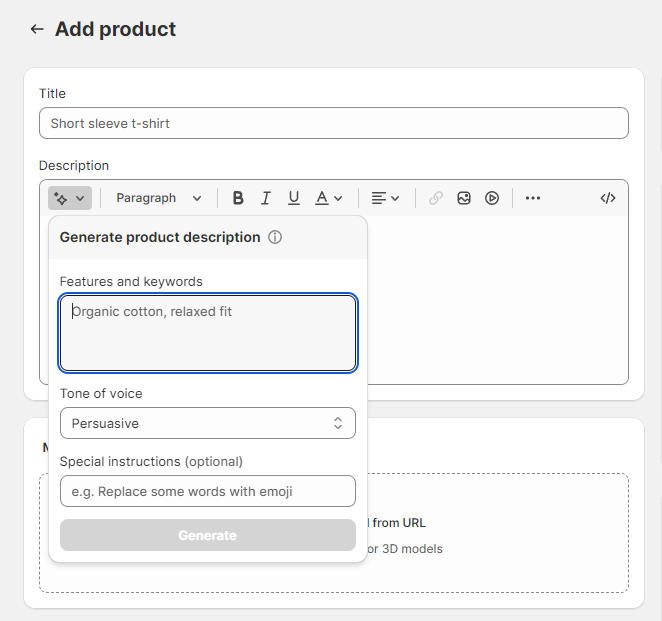
Portfoliobox, with a score of 0, does not offer any AI capabilities. It is designed primarily for creative professionals to showcase their work and does not incorporate AI-driven features.
User Management
User ManagementAssesses the platforms’ capabilities in managing user roles, permissions, and accessibility.Score Components:
- Role Customization (40%): Flexibility in creating and defining user roles and
permissions. - Ease of Management (30%): User interface and tools for managing users.
- Access Control (20%): Effectiveness of access control measures for different user
levels. - Scalability (10%): Ability to manage a growing number of users efficiently.
 6.5
6.5
 2.8
2.8
🏆 Winner: Shopify
. When it comes to managing users, Shopify offers a more robust system compared to Portfoliobox.
- Shopify allows multiple user roles with configurable access levels, making it suitable for larger teams and collaborative work environments.
- Portfoliobox, on the other hand, is limited to a single user managing and editing the website, which may be restrictive for users needing collaborative features.
Shopify User Roles and Access Levels:
| Role | Description | Access Highlights |
|---|---|---|
| Store Owner | Full control over store | Manage products, orders, discounts, payments, apps, settings. Create and manage staff accounts. |
| Staff | Configurable access by owner | Add/edit products, manage orders, fulfill orders, manage customers, update content. Access level can be customized by the owner. |
| Collaborator | Limited access for external partners | View and manage specific sections like blog or product categories. Cannot access full store settings. |
Portfoliobox User Management:
The platform allows only one user to manage and edit a website.
Additional Features

|

|
|
|---|---|---|
|
SSL Certificate |
✓ |
✓ |
|
Custom Domain |
✓ |
✓ |
|
Free Custom Domain Included |
X |
✓ |
|
International Domains |
✓ |
✓ |
|
Mobile Responsive |
✓ |
✓ |
|
Page Speed |
✓ |
✓ |
|
Website Builder Mobile App |
✓ |
X |
|
Convert a Website To An App |
X |
X |
|
Website Analytics |
✓ |
✓ |
|
Multilingual Sites |
✓ |
✓ |
|
Multiple Users |
✓ |
X |
User Feedback
Shopify’s slightly higher rating on G2 Crowd can be largely attributed to its specialization in ecommerce. Its comprehensive features, ease of use, and robust customer support cater specifically to online businesses, leading to high user satisfaction among those seeking a dedicated ecommerce solution.
Users overwhelmingly appreciate Portfoliobox for its user-friendly interface, making it straightforward for both beginners and professionals to create and manage online portfolios. The platform’s customizable design options, responsive layouts, and diverse template selection stand out as significant advantages, allowing users to express their personal style and showcase their work effectively across devices. However, some critiques include limited template options compared to competitors, a learning curve for less tech-savvy users, and minor glitches with features like autosave on different devices.
The making of this blog
We followed a clear, step-by-step process to write and research this article.
FAQ
Which platform is better for ecommerce, Shopify or Portfoliobox?
Can I use both Shopify and Portfoliobox for portfolio websites?
How do Shopify and Portfoliobox differ in terms of user support and learning resources?
What are the main differences in pricing between Shopify and Portfoliobox?










